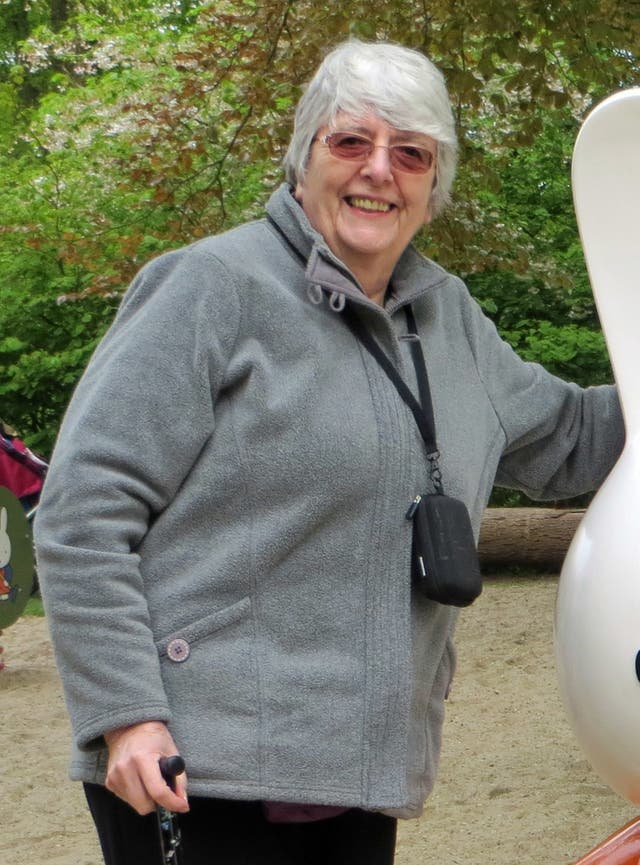Patients with rare disease call for better awareness after life-long suffering
People who have suffered symptoms of Charcot-Marie-Tooth decades before diagnosis have called for heightened awareness among medical practitioners.

Patients with a rare disease which affects thousands of people across Britain have called for better awareness among health workers after waiting decades to be diagnosed.
Charcot-Marie-Tooth (CMT) – which can cause pain, chronic fatigue and deformities in the hands, lower legs and feet, leading to balance problems and falls – is thought to affect around 23,000 people across Britain.
But the charity Charcot-Marie-Tooth UK said that the genetic, neurological disorder is not well-known in medical circles.
Patient Valerie Bradley was only diagnosed when she was 78 years old, despite showing symptoms her whole life.

years old, despite showing symptoms her whole life.
Ms Bradley, from Stourport on Severn, Worcestershire, started showing signs of the condition as soon as she began walking as a toddler.
As a child she had weak ankles and was always tripping and falling over, but her parents were simply advised by their GP to put her in buckskin boots to “straighten her ankles out”.
During her life, she has been diagnosed with a horde of different ailments until she finally received a diagnosis of CMT.
The 79-year-old said: “Over the years, due to pain in my feet, ankles, knees and hips, I’ve been diagnosed with osteoarthritis, osteoporosis, pseudo gout, scoliosis and a trapped vertebra – but never CMT, although I have always had the classic symptoms.
“It wasn’t until the end of 2016, when I went to see my GP again as I had constant fatigue, pain and numbness in my legs, and I was finding it increasingly difficult to grip with my hands, that I was referred to a neurologist and neurosurgeon.
“After reading my notes, testing my reflexes and giving me a full body and brain scan, it was the neurologist who eventually diagnosed me with CMT – at 78 years old.
“When I told my GP I had CMT, he hadn’t even heard of it. Awareness must be raised among the medical professions so other people can be diagnosed quicker and get the help and support they need.”
Sue Kelly, 52, from Leeds was diagnosed with CMT in 2010, despite showing classic symptoms of the condition since early childhood, including as high arches, hammer toes and tripping and falling.
Mrs Kelly said: “It wasn’t until my father died and Charcot-Marie-Tooth was listed as the secondary cause of death on his death certificate that I Googled the name and came across pictures of feet that looked just like mine.
“The information I was reading told me that I needed to see a neurologist, so I visited my GP, who had also never heard of CMT and had to Google it while I was sat in front of her.
“Getting a diagnosis after all these years was a bit of a relief.
“My CMT is gradually getting worse and is starting to affect my hands, but it is still relatively mild compared to some cases.
“My balance is poor and I struggle with steps and stairs.
“My fingers are starting to curl, I have painful spasms in my hands and feet, and my circulation is poor.”
CMT UK is raising awareness of the condition throughout September, in particular trying to highlight the disorder and its symptoms among people who have the condition, but have not yet been diagnosed.
It also aims to make more medical professionals aware so people who have CMT can get diagnosed and seek help.
CMT UK’s chief operating officer Karen Butcher said: “There are still too many medical professionals including GPs, physiotherapists, orthotists, surgeons – and even neurologists – that still don’t know what CMT is, therefore an integral part of this year’s campaign will be to educate them about the condition, so they can help make a diagnosis if needed.
“It is also important for us to reach those people who think they might have the condition, but haven’t been diagnosed yet.
“Sometimes the symptoms aren’t obvious, but due to the fact that CMT affects the hands and feet, it could be they have trouble balancing, find they regularly trip or fall over and are constantly tired.”
For more information visit: http://cmt.org.uk/





